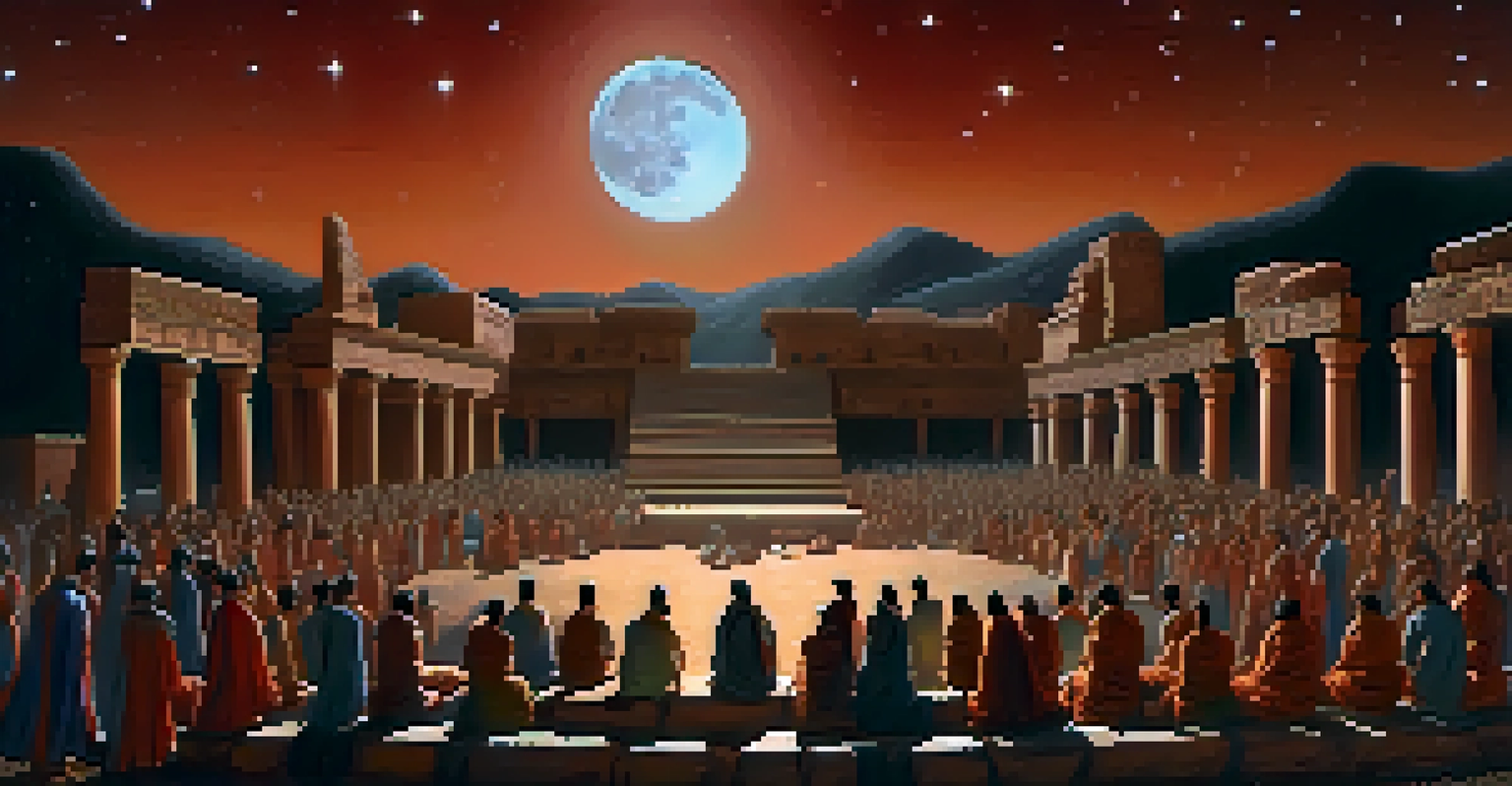The Spiritual Significance of Eclipses Across Cultures

Eclipses: A Universal Phenomenon with Deep Meaning
Eclipses have captivated humanity for centuries, often stirring spiritual curiosity. Across various cultures, they are seen as powerful omens or divine messages. This fascination stems from the dramatic change in the sky, which prompts reflection on life’s deeper mysteries.
Eclipses are like a cosmic reset button; they remind us to pause and reflect on our life's journey.
For many, an eclipse symbolizes a cosmic reset, a time to pause and contemplate one's life journey. It’s not just an astronomical event; it’s a moment of introspection that invites people to consider their place in the universe. This universal intrigue connects us, regardless of our cultural backgrounds.
By exploring different interpretations of eclipses, we can appreciate the rich tapestry of beliefs that describe our relationship with the cosmos. Each culture offers unique insights, allowing us to find meaning in these celestial events.
Ancient Civilizations and Eclipses
In ancient civilizations, eclipses were often interpreted as signs from the gods. For instance, the Babylonians viewed a lunar eclipse as a warning, believing it foretold the downfall of rulers. Such beliefs illustrate how eclipses inspired both awe and fear in early societies.

Similarly, the Mayans meticulously tracked celestial events, including eclipses, which they integrated into their religious practices. They believed that these occurrences were pivotal for agriculture and societal well-being, linking the cosmos directly to their daily lives.
Eclipses Inspire Cultural Reflection
Across various cultures, eclipses are seen as profound moments prompting spiritual reflection and connection to the universe.
These historical perspectives underscore the profound impact eclipses had on shaping cultural narratives. As people looked to the skies for guidance, they wove these celestial events into the fabric of their belief systems, influencing everything from governance to agriculture.
Eclipses in Eastern Spiritual Traditions
In Eastern cultures, eclipses are often viewed through a spiritual lens, symbolizing transformation and renewal. For example, in Hinduism, an eclipse is considered a time for reflection and purification. Rituals are performed to rid oneself of negative energies during these cosmic events.
The universe is not outside of you. Look inside yourself; everything that you want, you already are.
Chinese culture also harbors deep beliefs surrounding eclipses. Traditionally, they were perceived as signals of impending change, often related to the emperor's fate. This connection illustrates how celestial events can mirror earthly power dynamics, reinforcing the idea that the cosmos influences human affairs.
These interpretations emphasize the importance of embracing change during an eclipse, encouraging individuals to let go of the past. By recognizing the transient nature of life, people can find solace and strength in the face of uncertainty.
Western Perspectives on Eclipses
In the Western world, eclipses have historically been viewed as both omens and opportunities. During the Middle Ages, eclipses were often seen as bad omens, signaling chaos or disaster. Yet, as knowledge of astronomy advanced, people began to embrace these events with a sense of wonder.
Today, many in Western cultures view eclipses as an opportunity for personal growth and spiritual awakening. They are seen as moments to set new intentions, aligning personal goals with the transformative energy of the cosmos. This shift reflects a broader trend toward embracing holistic practices.
Ancient Beliefs Shape Responses
Historical interpretations of eclipses, such as those by the Babylonians and Mayans, reveal how these events influenced societal norms and practices.
Such perspectives demonstrate how eclipses can serve as catalysts for change, urging individuals to reflect on their lives. Whether as a foreboding omen or a chance for renewal, eclipses remain a powerful symbol in Western spirituality.
The Role of Eclipses in Indigenous Cultures
For many Indigenous cultures, eclipses are viewed as sacred events that signify a connection to the earth and the universe. The Navajo, for example, see eclipses as a time to honor the balance of life, integrating them into their spiritual practices. This connection fosters a deep respect for nature and its cycles.
Similarly, in parts of Africa, eclipses are often celebrated with communal gatherings and rituals. These events are seen as opportunities to strengthen community bonds and reaffirm cultural traditions. The shared experience of witnessing an eclipse brings people together, reinforcing societal values.
Such practices illustrate how eclipses can serve as communal touchstones, highlighting the interconnectedness of people and nature. By celebrating these celestial events, Indigenous cultures reinforce their values and beliefs, ensuring that the significance of eclipses is passed down through generations.
Modern Spiritual Practices and Eclipses
In contemporary spiritual practices, eclipses have gained popularity as times of intention-setting and manifestation. Many people gather to meditate during these events, harnessing the energy of the eclipse to manifest their desires. This modern approach reflects a growing interest in personal empowerment and spiritual growth.
Social media plays a significant role in how we engage with eclipses today. Online communities share rituals, meditations, and insights, creating a global conversation around these celestial phenomena. This connectivity allows for diverse interpretations and practices to flourish, enriching the spiritual experience.
Modern Spirituality Embraces Eclipses
Today, eclipses are embraced as opportunities for personal growth and intention-setting, merging ancient beliefs with modern spiritual practices.
As we embrace modern spirituality, eclipses serve as a reminder of our connection to the cosmos. They invite us to pause, reflect, and align our intentions with the universe, making these moments truly transformative.
The Science Behind Eclipses and Their Spiritual Impact
While eclipses are fascinating spiritual events, they are rooted in scientific phenomena. A solar eclipse occurs when the moon passes between the Earth and the sun, casting a shadow on the Earth. Similarly, a lunar eclipse happens when the Earth passes between the sun and the moon, resulting in the moon appearing reddish.
Understanding the science behind eclipses can enhance our appreciation for their spiritual significance. Recognizing these events as natural occurrences helps demystify them, allowing us to approach them with both awe and knowledge. This blend of science and spirituality can deepen our connection to the world around us.

By embracing both the scientific and spiritual aspects of eclipses, we can create a more holistic understanding of their impact on our lives. This dual perspective encourages us to celebrate these celestial events as profound moments of reflection and growth.